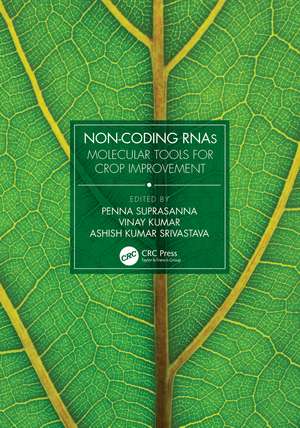Non-Coding RNAs: Molecular Tools for Crop Improvement
Editat de Penna Suprasanna, Vinay Kumar, Ashish Kumar Srivastavaen Limba Engleză Hardback – 29 dec 2023
Key features:
- Discusses the different types of non-coding RNAs including lnc-RNAs, siRNA, microRNAs, and tasiRNAs
- Covers the role of plant non-coding RNAs in epigenetic regulation of environmental stress response and tolerance
- Reviews the role of non-coding RNAs under environmental stresses like drought, water logging, salinity, extreme temperature, UV, heavy metals, and xenobiotics
- Explores the use of non-coding RNAs in transgenic crops and genome editing
- Describes the biogenesis, history, and classification of non-coding RNAs in plants
Preț: 1060.74 lei
Preț vechi: 1293.59 lei
-18% Nou
Puncte Express: 1591
Preț estimativ în valută:
202.98€ • 212.35$ • 168.61£
202.98€ • 212.35$ • 168.61£
Carte tipărită la comandă
Livrare economică 02-16 aprilie
Preluare comenzi: 021 569.72.76
Specificații
ISBN-13: 9781032425443
ISBN-10: 103242544X
Pagini: 234
Ilustrații: 17 Tables, black and white; 20 Line drawings, black and white; 20 Illustrations, black and white
Dimensiuni: 178 x 254 x 14 mm
Greutate: 0.63 kg
Ediția:1
Editura: CRC Press
Colecția CRC Press
ISBN-10: 103242544X
Pagini: 234
Ilustrații: 17 Tables, black and white; 20 Line drawings, black and white; 20 Illustrations, black and white
Dimensiuni: 178 x 254 x 14 mm
Greutate: 0.63 kg
Ediția:1
Editura: CRC Press
Colecția CRC Press
Public țintă
Academic, Postgraduate, and Professional ReferenceCuprins
Chapter 1: Small RNAs in Plants: Are These Magic Bullets for Imparting Climate Resilience in Crops?
Chapter 2: Regulatory role(s) of plant small non-coding RNAs in relation to trait improvement in crops
Chapter 3: Plant Non-Coding miRNA and Their Importance in Plants Physiology
Chapter 4: miRNA regulated transcription factor networks in response to osmotic stress
Chapter 5: MicroRNA-mediated strategies for conferring biotic stress tolerance in plants
Chapter 6: Identification and Characterization of Plant ncRNA Responsive to Climate Change
Chapter 7: Plant Non-Coding RNAs and their Regulation in Salinity and Heavy Metal Stress
Chapter 8: Ionizing Radiation Induced Non-coding RNA in plants and their Implication in Mutation Breeding
Chapter 9: Role of Noncoding RNAs in Abiotic Stress Response & Adaptation in Chickpea
Chapter 10: Plant Functional Long Non-Coding RNAs: Yesterday’s dark matter, today’s regulatory component for abiotic stress response
Chapter 11: Machine learning approaches for long non-coding RNA identification in plants
Index
Chapter 2: Regulatory role(s) of plant small non-coding RNAs in relation to trait improvement in crops
Chapter 3: Plant Non-Coding miRNA and Their Importance in Plants Physiology
Chapter 4: miRNA regulated transcription factor networks in response to osmotic stress
Chapter 5: MicroRNA-mediated strategies for conferring biotic stress tolerance in plants
Chapter 6: Identification and Characterization of Plant ncRNA Responsive to Climate Change
Chapter 7: Plant Non-Coding RNAs and their Regulation in Salinity and Heavy Metal Stress
Chapter 8: Ionizing Radiation Induced Non-coding RNA in plants and their Implication in Mutation Breeding
Chapter 9: Role of Noncoding RNAs in Abiotic Stress Response & Adaptation in Chickpea
Chapter 10: Plant Functional Long Non-Coding RNAs: Yesterday’s dark matter, today’s regulatory component for abiotic stress response
Chapter 11: Machine learning approaches for long non-coding RNA identification in plants
Index
Notă biografică
Dr. Penna Suprasanna is a Professor & Director, Amity Centre for Nuclear Biotechnology, Amity University, Mumbai, Maharashtra, India. He is the Former-Head of the Nuclear Agriculture & Biotechnology Division, Bhabha Atomic Research Centre, Mumbai. His research interests are agricultural biotechnology, climate-smart agriculture, molecular plant stress physiology, and nuclear agriculture. He has served as an expert with International Atomic Energy Agency (IAEA), Vienna (Austria) and Member, Food Security Committee, Board of Research in Nuclear Sciences, DAE. He has more than 360 research publications to his credit and has edited books on Plant Nutrition and Food Security, Plant metal interactions, Stress tolerance and mutation breeding.
Dr. Vinay Kumar is an Associate Professor at the Department of Biotechnology, P.E.S. Modern College of Arts, Science and Commerce, Savitribai Phule Pune University, Ganeshkhind, Pune, India. His research interests are plant-environment interactions, environmental stress biology, crop biotechnology, environmental biotechnology, antimicrobial resistance, nanotechnology, and natural products. He has published more than 75 research articles and 7 published books to his credit.
Dr. Ashish Kumar Srivastava is a Scientific Officer ‘G’ at the Nuclear Agriculture and Biotechnology Division, Bhabha Atomic Research Centre, Mumbai, India. He completed his Ph.D. from Homi Bhabha National Institute, Department of Atomic Energy, Mumbai, India. His research work is focused on understanding the molecular mechanism of abiotic stress tolerance in crops. So far, he has published 65 research articles and edited 2 books.
Dr. Vinay Kumar is an Associate Professor at the Department of Biotechnology, P.E.S. Modern College of Arts, Science and Commerce, Savitribai Phule Pune University, Ganeshkhind, Pune, India. His research interests are plant-environment interactions, environmental stress biology, crop biotechnology, environmental biotechnology, antimicrobial resistance, nanotechnology, and natural products. He has published more than 75 research articles and 7 published books to his credit.
Dr. Ashish Kumar Srivastava is a Scientific Officer ‘G’ at the Nuclear Agriculture and Biotechnology Division, Bhabha Atomic Research Centre, Mumbai, India. He completed his Ph.D. from Homi Bhabha National Institute, Department of Atomic Energy, Mumbai, India. His research work is focused on understanding the molecular mechanism of abiotic stress tolerance in crops. So far, he has published 65 research articles and edited 2 books.
Descriere
This reference book compiles updated research on non-coding RNAs and their role in producing high-yielding plants with no penalties under changing climates. The book covers the sequencing, identification, prediction, identification, characterization, and targets of non-coding RNAs to engineer high-yielding crops.
